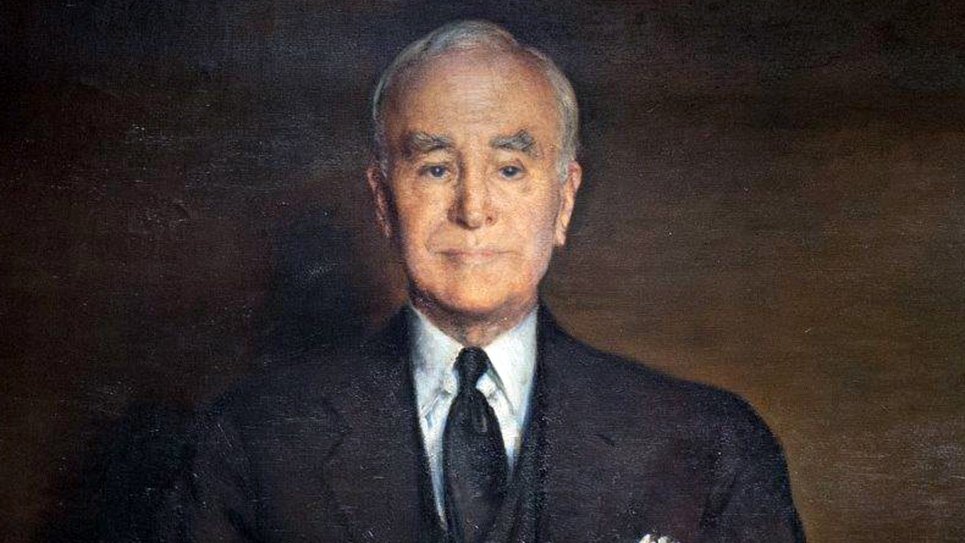Cordell Hull and Reciprocal Trade
By Ray Hill
Tariffs are much in the headlines these days, and it occurred to me that it would be an appropriate time for a column relating to reciprocal trade treaties. Many readers may not know that it was a Tennessean who was responsible for brokering most of our country’s reciprocal trade agreements. That Tennessean was Cordell Hull, our country’s longest-serving secretary of state.
Cordell Hull was the third of five sons born to William and Elizabeth Riley Hull. Orestes was the oldest, followed by Senadius, Cordell, Wyoming and Roy. William, known to locals as “Uncle Billy,” was a successful businessman who had made money through floating timber, meat, corn and other products down the Cumberland River. Cordell earned money as a teenager by floating products down the Cumberland to New Orleans and taking a steamboat back home. “Uncle Billy” became quite prosperous through being an entrepreneur, but he was also a man of steely determination who settled his own debts. One of those debts was having been shot and left for dead, a bullet passing through his head. Miraculously, “Uncle Billy” was nursed back to health and unimpaired. Billy Hull walked from Tennessee to Kentucky and back again to find the man responsible for having nearly ended his life. Once Billy Hull found the man, he shot him dead without hesitation or mercy before turning around and walking back to Tennessee.
Prior to having been selected by President Franklin D. Roosevelt to become secretary of state, Cordell Hull had held numerous offices, beginning with being elected chairman of the Clay County Democratic Party at age 18 at a time when a man was not allowed to vote until having turned 21 years of age. Years later, after having retired as secretary of state, Hull told a visiting Governor Gordon Browning and a delegation of Tennesseans, including veteran state legislator, I. D. Beasley, “the Mockingbird of Capitol Hill,” that having been elected party chair before being eligible to vote was the achievement of which he was proudest in his long career. After having graduated from Cumberland College, Hull was elected to the Tennessee House of Representatives in 1892 when he was 21 years old. Hull was reelected in 1894 and went to serve in the Spanish-American War. Sporting a moustache at the time, Hull proved to be a formidable card player and reputedly won more than $6,000 (an amount equal to about $230,000 in today’s dollars) playing poker with his comrades.
Cordell Hull was appointed a judge of the circuit court by Governor James B. Frazier and was elected to a term of his own by the people. Judge Hull ran for Congress in 1906 against the incumbent and a well-known attorney who was quite an orator. Hull won the primary by about fourteen votes. Congressman Hull faced attorney James Miller again in 1908, but having had the opportunity to entrench himself, won decisively. Hull served Tennessee’s Fourth Congressional District, a collection of about fourteen counties with the largest city being Cookeville. Almost entirely rural and agricultural, the Fourth District had been represented by Benton McMillin for 20 years before he ran for governor in 1898. For the next eight years, the Fourth Congressional District became hard to hold for its incumbent congressman, none of whom were reelected until Hull managed it in 1908. Hull was a great admirer of Benton McMillin, and the former congressman’s brother, Joe, had been one of Hull’s favorite teachers. Like McMillin, Hull proved to be highly popular with the people of Tennessee’s Fourth Congressional District.
Cordell Hull was routinely reelected to the House of Representatives every two years until 1920, when the unthinkable occurred. Hull had been largely opposed to the Nineteenth Amendment to the U.S. Constitution, which gave women the right to vote. Like many of his peers, Congressman Hull insisted it was a state, rather than a federal issue. So, too, had Governor A. H. Roberts been a foe of the Nineteenth Amendment, right up until Tennessee became the final state to ratify it, adding it to the Constitution. Not all Tennessee Democrats had been opposed to ratification of the Nineteenth Amendment; the most prominent Democratic supporter of giving women the right to vote in the Volunteer State was U.S. Senator Kenneth D. McKellar. In 1920, women expressed their dissatisfaction, and the Republicans carried Tennessee in the general election. Warren Harding beat James Cox in the presidential election in the Volunteer State, and Governor Roberts lost to 72-year-old Alf Taylor. Republicans won five of Tennessee’s ten congressional seats. Veteran Congressmen John A. Moon of Chattanooga and Cordell Hull lost to their GOP opponents.
Hull was elected chairman of the Democratic National Committee in 1921, and his first order of business was regaining many of the seats lost by the Democrats in the U.S. House of Representatives and U.S. Senate, including his own. Hull made no secret that he would seek reelection from the Fourth District in 1922. Cordell Hull presided over a Democratic revival, and he beat Republican Congressman Wynne F. Clouse easily to return to the House. Hull was reelected every two years until he ran for and was elected to the United States Senate in 1930. It was in 1933 that President Roosevelt picked Hull to serve as his administration’s secretary of state.
Hull was no southern firebrand, nor was he an especially gifted orator. Rather, Cordell Hull succeeded through intellect and sheer hard work. Hull’s contemporaries in Congress respected his knowledge of finance and taxation. Prior to 1913, the United States government was funded solely through tariffs on goods and products. It was Hull who became the father of the income tax, which was negligible when first conceived but became confiscatory during the Second World War when some citizens were in tax brackets as high as 90% and 95%.
Democrats in the 1880s were, by and large, opposed to many of the high tariff policies pushed by Republicans. Benton McMillin had argued that the tariffs brought in so much money it could be lowered and still pay the expenses of the federal government. Tariffs existed for trade and protectionism. The Republican Party was largely the more protectionist of the two, although the Democrats were solidly for protecting native products of their own, including sugar, cotton and tobacco. Countries adopted tariffs to protect their own products and industries. That protectionist policy frequently helped the industries maintain their factories and kept the employees of those factories employed. Protection shielded industries and provided opportunity for greater economic development.
Tariff policy could and did affect the outcome of elections. The 1890 election was a disaster for Republicans due almost entirely to the tariffs pushed by William McKinley, then a congressman and chairman of the House Ways & Means Committee. The electoral backlash to the higher tariffs cost McKinley his own seat in the House of Representatives.
With the advent of the Great Depression and his becoming secretary of state, Cordell Hull argued that virtually every war started because one country coveted either the territory or natural resources of another. Hull became the chief apostle of America negotiating reciprocal trade agreements with other countries, which he believed would negate the possibility of friction between countries and greatly reduce the possibility of war. Hull approached the task with zeal equal to that of an apostle.
Reciprocal trade can best be described as agreements between nations to either remove or lower tariffs and other barriers to trade, the object being to increase trade between countries. It was, Hull insisted, beneficial to all. Throughout his time as secretary of state, Cordell Hull was quite nearly obsessed with the notion of fostering reciprocal trade agreements across the globe. The idea oftentimes involved both countries making some concessions with regard to tariffs or quotas.
Secretary of State Hull pushed the Reciprocal Trade Agreements Act of 1934, which gave President Roosevelt the power to negotiate with other countries, in an effort to reduce tariffs and trade barriers with the trading partners of the United States. One important feature of the Reciprocal Trade Agreements Act of 1934 was the provision that required a two-thirds majority to repeal a tariff reduction.
Hull, a veteran of 24 years in Congress, had watched the Republicans and many Northern Democrats seek protection for the products manufactured in their region of the country. The South’s economy was largely dependent on exporting products, mostly agricultural products rather than manufactured goods. Like many Southerners of his time, Cordell Hull firmly held the conviction that any country which taxed imports would most certainly find it more difficult to export goods. Like most of his Democratic brethren from the Southland, Hull was a proponent of low tariffs.
Throughout his congressional service, Hull sought to push the idea of a world trade conference, although unsuccessful, the Tennessean’s belief in reciprocal trade agreements evolved and became the cornerstone of his beliefs where trade was concerned. Hull had positively loathed the Smoot-Hawley Act, which had seen the height of protectionism with virtually every state and product protected through increased tariffs. The bill was authored and sponsored by Senator Reed Smoot, an austere Mormon elder who had been in the United States Senate for almost 30 years, and Congressman Willis C. Hawley of Oregon. Hawley was a former educator who had been in Congress since 1907, arriving in Washington, D.C., for the first time along with Cordell Hull. Both Smoot and Hawley were Republicans.
Tariffs in America were at historically high levels already and the average tariff was raised some 20% by the Smoot-Hawley Act, which was signed into law by President Herbert Hoover. The governments of other countries around the world raised their own tariffs on products and goods from the United States accordingly. That startled Wall Street, which started a significant loss of confidence. International trade was sharply curtailed due to the high tariffs as the economies of countries all over the world began to diminish. Cordell Hull believed Smoot-Hawley was one of the chief reasons for the onset of the Great Depression. Evidently, voters agreed as both Senator Smoot and Congressman Hawley were defeated in their 1932 reelection campaigns. Smoot lost the general election to a Democrat while Hawley did not survive his primary contest.
Congressmen and senators regularly engaged in what came to be known as the practice of “logrolling,” which was supporting other members and protecting the products and goods of their states in return for the support of their own state’s industries and products. Few members of Congress considered the long-range effect upon the economies of other countries, content to focus upon the people who had sent them to Washington, D.C. With the decade of the 1950s, the differences between the two major political parties on tariff issues had become relatively the same.
Cordell Hull pushed the Reciprocal Trade Agreements Act in 1934 as something of a remedy for the Depression as well as the prevailing high tariffs. As a result of its passage, Franklin Roosevelt was able to renegotiate tariff agreements with other countries to the mutual benefit of the United States and its trade partners. The Reciprocal Trade Agreements Act ended the era of high protectionism for decades. The result of the act between its passage in 1934 and 1945 at the end of the Second World War was 32 trade agreements between the United States and 27 other nations. The Reciprocal Trade Agreements Act was extended routinely, with one exception, until 1961 when the General Agreement on Tariffs and Trade took effect.
Cordell Hull lived to see world trade expand dramatically with world markets burgeoning. Hull was the architect of the United States’ “Good Neighbor” policy with Latin America and is remembered today for being the “Father of the United Nations,” a title bestowed upon him by President Franklin Roosevelt.
© 2025 Ray Hill
Note from Ray Hill
I have completed a book manuscript on Cordell Hull, and my biography of Tennessee’s longest-serving U.S. senator, Kenneth McKellar, is available for pre-order on Amazon.com. “Senator Kenneth McKellar: Feudin’ Son of Tennessee” is published by the University of Tennessee Press. Get your copy now!






